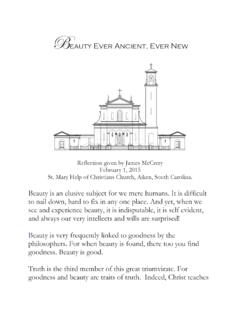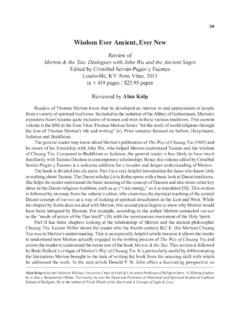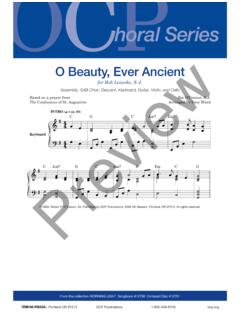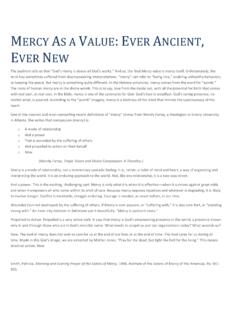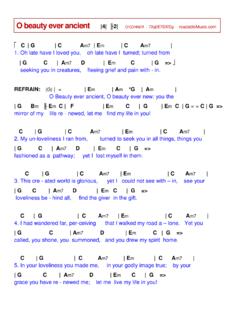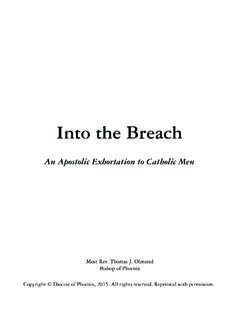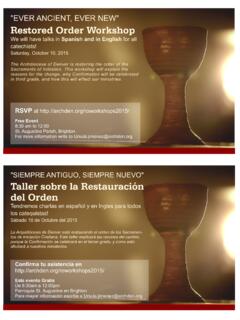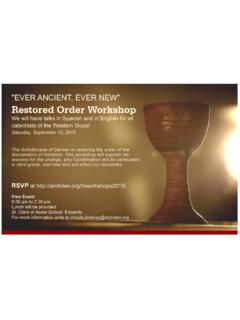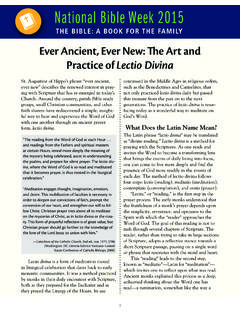Transcription of Wisdom Ever Ancient, Ever New, Ever Beautiful - merton.org
1 4 1 Wisdom Ever ancient , ever new , Ever Beautiful Revie w of Essential Monastic Wisdom : Writings on the Contemplative Life Edited, Translated and Introduced by Hugh Feiss, OSB Foreword by Kathleen Norris San Franc isco: HarperSanFrancisco, 1999 xx+ 220 pages I $ hardcover; $ paperback Reviewed by Augustine Jackson, OCSO In Essential Monastic Wisdom we see some of the fruits of the personal and communal monastic journey of Fr. Hugh Feiss, OSB, a Benedictine monk for some thirty-five years who resides at Asce n-sion Prio ry, Je rome, Idaho. Jus t when you think that you can' t handle one more computer glitch or that you might succumb to road rage, Feiss reorients us to ward more timeless and enduring values, like simplic ity, humility, patience and lo ve.
2 These are four of the eighteen topics presented in this superb anthology of monastic texts, each of which includes a solid introductory ess ay to the maxims that follow. All Christian monks and nuns should possess an arsenal of essential monastic Wisdom upon which they can feed in the ir sac red reading or " lectio divina." This sourcebook shows how such Wisdom is rele vant to those outs ide the cloister as well. By arranging the material as Feiss does in thematic and chronological order, he simplifies for us a vast body of monastic teachings or "words." Seeking a word from a spiritual fathe r or mother i s an ancient monas tic practice; the very book j acket positions a monk outside a cell as if to wait and listen to a word from his elder.
3 These powerful " words" in Feiss' book are delivered by the most prominent monastic teachers of the Christian cen-turies. Thus one must not approach this material as an exercise in speed-reading, but " ruminate" on it in classic monastic fa shio n. When Feiss says, "Speech should arise from humility" and "be at the service of truth" (69), or "Discretion .. is the pivotal monastic virtue" (66), he is relating something passed on by his monas-tic forbears. When Antony says, "our destruction is from o ur neig hbor, and our life is al so from our neighbor" (47) or Syncletica warns, "You should not.
4 Accept empty hearsay, lest you become a receptacle for other peoples' e vils" (72), they stand at the beginning of the tradition and utter their words as archetypes or winds in the desert. When we read Antony's sayings, "Some have afflicted their bodies with asceticis m, but they lack discernment, and so they are far from God" ( 115), and "wherever you live , do not leave it easily" (147), how this jars modem thought within our diet-Augustine Jackson OCSO is archivis t o f the Abbey o f the Genesee, Piffard, N Y. His slide-s ho w, '"No rth of Geth se mani: An Illustrated History of the A bbey o f the Genesee" was a featured prese ntation at the ITMS Sixth Ge neral Meeting in June 1999.
5 42 consc io us and mobile culture. There are even counterc ulturaJ political in vectives administered by monks, s uch as (from the lips of a di sciple of Pachomiu s): "if a person desires power, that person p robably s ho uld not be given authority' ( 159), or, "there is no poison more dangerous .. nor sword more deadly, than the lu s t to dominate" (Bernard, 168)-a nd here we are in an e lecti on year! Every d ay the re is something abuzz o n the campaign trail as the candidates jockey for influe nce or po wer. More than twenty me n and women are represented in the antho logy, fro m the Desert Fathers a nd Mothers and St.
6 Benedict, th roug h great medieval teache rs like Bede and Gertrude, Bernard and Hildegard, to the present. Whe n Fe iss comes to the "word s" of o ur generati on, with teachers like M erton (represented by more than two dozen passages) and Joan C hittister, the word s they speak have been reiterated many times w ithin the trad ition, but they are repristinated: "A humble man can do great th in gs with a n uncommo n perfection because he is no lo nger concerned about in c identals, like his ow n interests and his own reputation, and therefore he no lo nger need s to waste his efforts in d efending the m'' (Merton, 98).
7 "f Humility isl a proper ense of self in a universe of wonders" (Chittister, 99); "it is not perfection that leads us to God; it is perseverance" (Chi tti s ter, 150). Modern mo nastic teachers spout essential monastic wisdo m from the founta in we have come to rely on, the Rule of Saint Benedict: " [Benedict] does not want people in positions simply to get a job done. He wants people in pos itions who embody why we bother t o do the j ob at all. He wants holy liste ners who care about the effect of what they do on everybo dy else" (Chittister, 17 1 ), because "whoever loves God, loves his own so ul" (Anto ny, 183).
8 Such monastic Wisdom is e ver ancient , ever new , and ever Beautiful .
